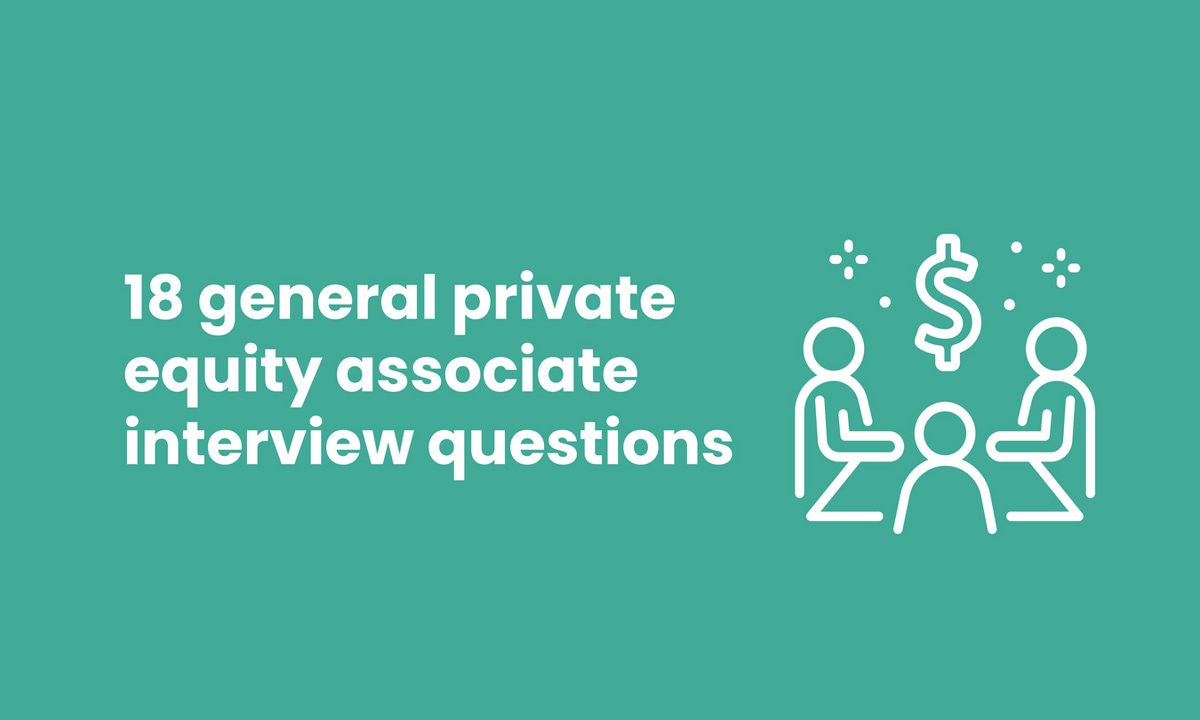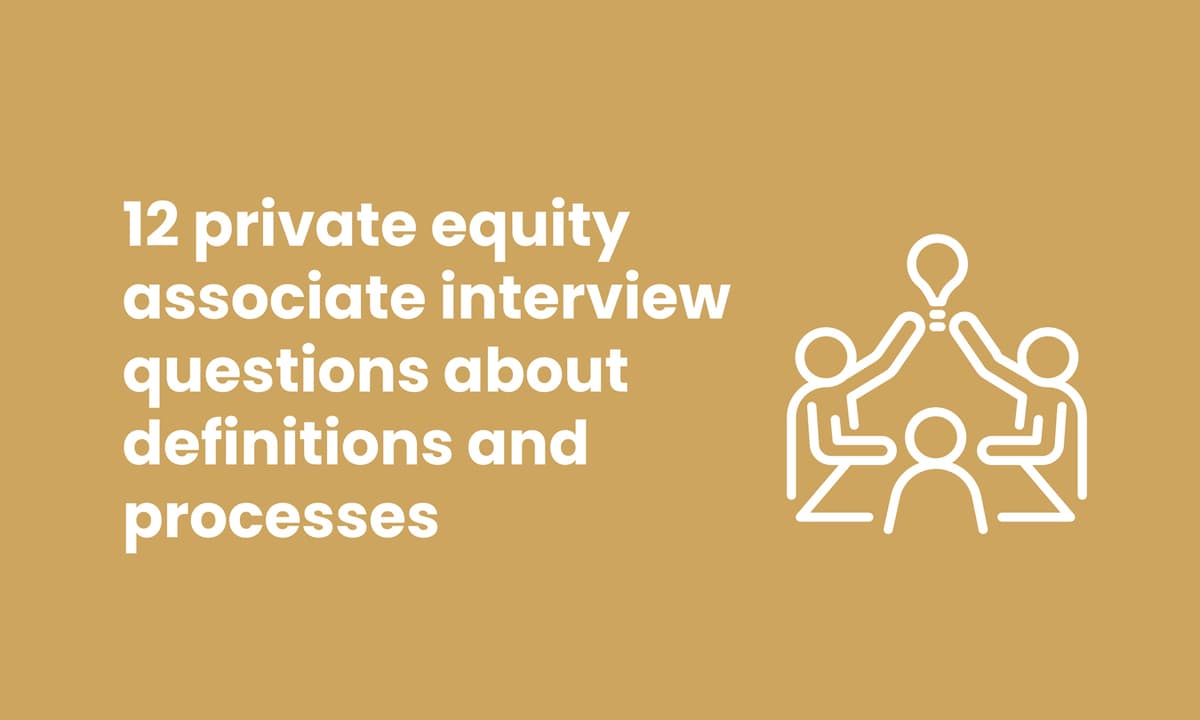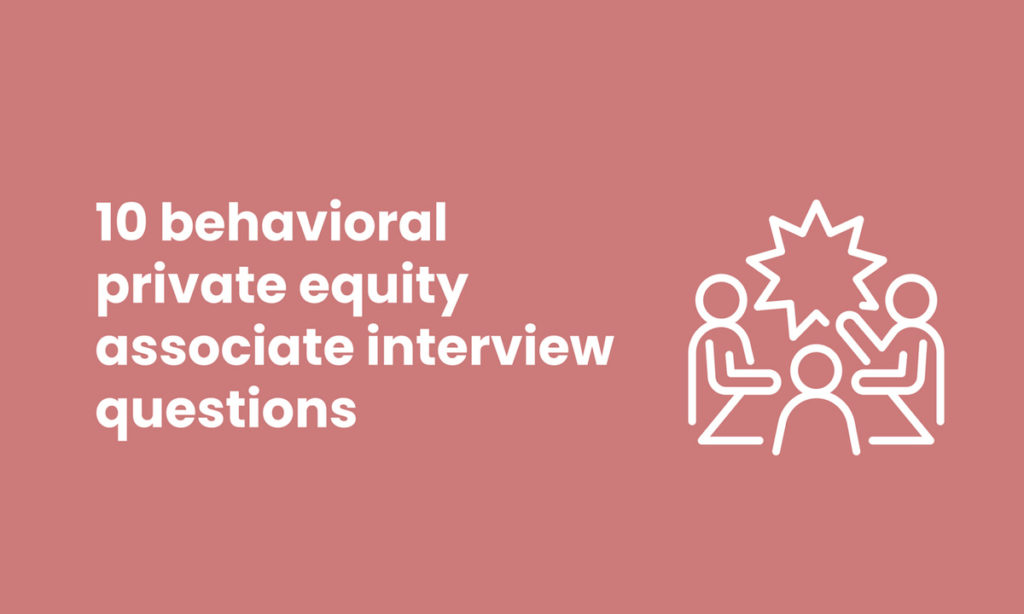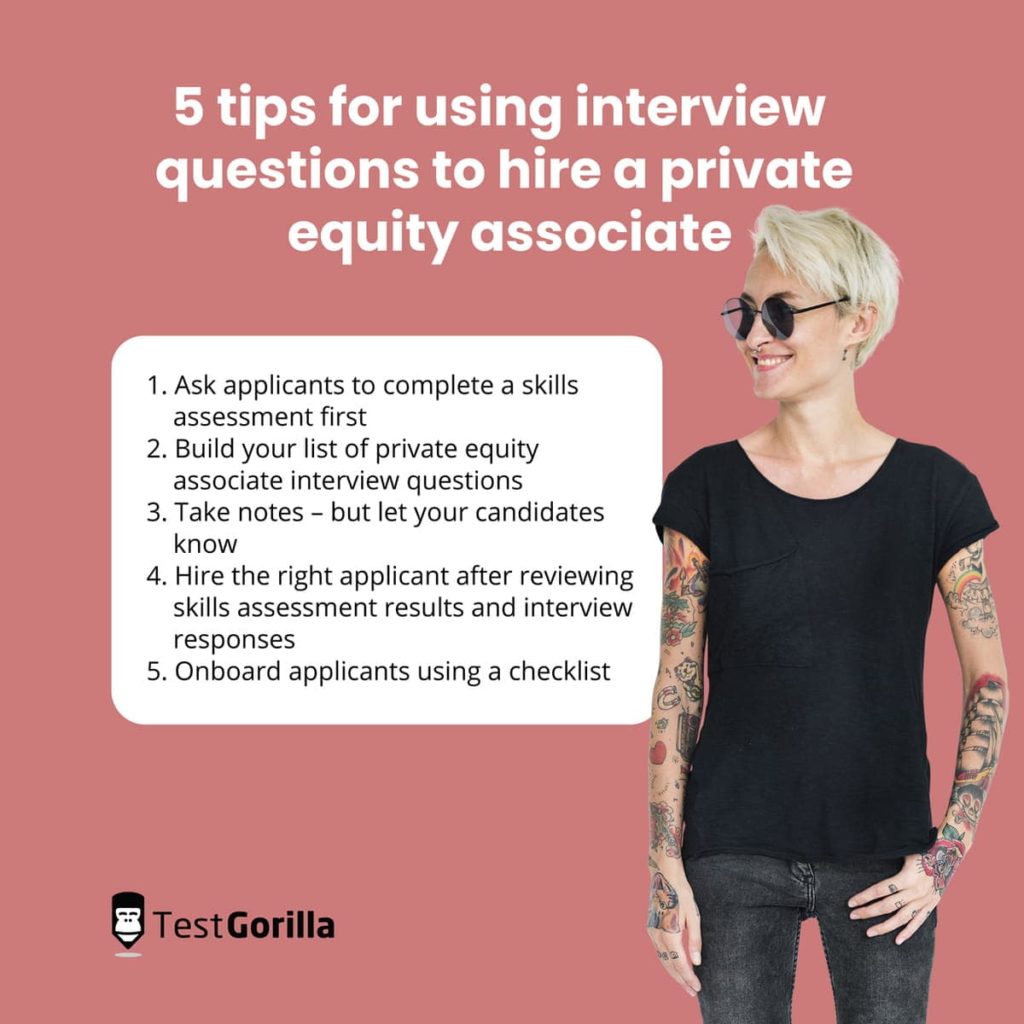40 private equity associate interview questions
If you’re hiring a private equity associate, there are many skills you must assess.
From sourcing investment opportunities to having solid exit trading strategies and everything in between, applicants need a range of private equity and finance associate skills.
Ensuring that you ask applicants the right private equity associate interview questions during the interview stage is crucial to assessing their skills efficiently. However, building the most suitable list of interview questions is not easy.
With this article, you’ll find inspiration to create your list of questions to ask.
We’ve also provided sample answers to some of them, which you can use as a guide to assess your applicants’ knowledge and skills. Look at the lists below for ideas for private equity associate interview questions.
Table of contents
- 18 general private equity associate interview questions
- 5 general private equity associate interview questions and answers
- 12 private equity associate interview questions about definitions and processes
- 5 private equity associate interview questions and answers about definitions and processes
- 10 behavioral private equity associate interview questions
- 5 behavioral private equity associate questions and answers
- 5 tips for using interview questions to hire a private equity associate
- Hire a private equity associate with the help of the right interview questions
18 general private equity associate interview questions
Gauge your applicants’ basic skills and knowledge by asking them some of the 18 general interview questions below.
Describe your private equity work experience so far.
Why have you chosen a career in private equity?
Can you give an example of the advantages of LBO modeling?
What are some disadvantages of LBO modeling?
What are some advantages of using market value?
What are some disadvantages of using market value?
Which hard skills do private equity associates need to perform well?
Which soft skills do private equity associates need to perform well?
Name the most significant error you have made in your previous role.
How would your current manager describe you?
How would your current manager describe your financial modeling skills?
What do you hope to have achieved in five years?
What are your favorite parts of private equity investing?
How do you stay motivated to perform well in the private equity field?
Name one way our firm is unique or stands out from other firms.
What is the most critical investment deal you have worked toward?
Name some consulting projects you were responsible for in your current role.
Which method do you use to keep up to date with the private equity industry?
5 general private equity associate interview questions and answers
Here are five of the general interview questions you can ask applicants, along with answers to use as a guide when you conduct interviews.
1. Which hard skills do private equity associates need to perform well?
Applicants should be aware that financial modeling skills are vital for private equity associates to perform well. They may also mention that industry knowledge is critical, as are math and financial analytics skills.
2. Which soft skills do private equity associates need to perform well?
Can your applicants explain that negotiation and problem-solving skills are crucial for private equity associates? Your candidates should also know that excellent communication skills are critical and make negotiation easier.
3. Which method do you use to keep up to date with the private equity industry?
You can ask applicants this question to understand how keen they are to work in the private equity field. Your applicants may attend financial networking events or read financial publications such as the Financial Times to stay up to date with news in the private equity industry.
4. Can you give an example of the advantages of LBO modeling?
An advantage of LBO modeling is that it shows the value of capital structure optimization and operational improvements.
5. What are some disadvantages of LBO modeling?
A disadvantage of LBO modeling is that it works by using inaccurate assumptions that correspond to an organization’s financial performance in the future. Applicants may also mention that LBO modeling leaves very little room for error.
The best insights on HR and recruitment, delivered to your inbox.
Biweekly updates. No spam. Unsubscribe any time.
12 private equity associate interview questions about definitions and processes
Assess your candidates’ specific knowledge by asking them some of these 12 interview questions about definitions and processes.
Which statements other than financial statements can help you evaluate an organization?
What are the limitations of financial statements, and what information do they lack?
Why is leverage necessary for private equity firms?
Describe what an LBO is.
Explain what TEV is.
Explain what EBITDA is.
Explain what maintenance covenants are.
Explain what incurrence covenants are.
Explain what DCF is.
Summarize what a cyclical industry is.
Summarize what rollover equity means.
Summarize what payment in kind interest means.
5 private equity associate interview questions and answers about definitions and processes
Here are five from the above questions about definitions and processes, together with sample answers you can use to guide you when interviewing your applicants for a private equity associate position.
1. What are the limitations of using financial statements without other information, and what information do they lack?
When responding to this question, applicants should talk about the income statement, balance sheet, and cash flow statement of a company. Are they aware of the limitations of using each of these financial statements?
For example, if private equity associates use the income statement without other information, they won’t know if an organization produces sufficient cash to be solvent.
If they use the balance sheet without other information, they won’t know if an organization is profitable over a longer period of time.
If they use a cash flow statement without any other information, they won’t be aware of any long-term liabilities that affect an organization’s ability to generate cash.
2. Summarize what a cyclical industry is.
Can your applicants explain that cyclical industries respond to business and economic cycles? Are they aware that cyclical industries are those whose revenues increase during periods of economic prosperity and decrease in downturns or economic contraction?
Summarize what rollover equity means.
Applicants should understand that rollover equity is a sum of money that business sellers will invest into a company’s future equity. They may also explain that some rollovers may receive deferred capital gains.
4. Summarize what payment in kind interest means.
Do your applicants know that payment in kind interest (PIK interest) is an option to pay dividends or interest amounts to investors? Applicants should also know that they can compensate the lender using PIK interest if a company has raised debt.
5. Explain what maintenance covenants are.
A maintenance covenant is an agreement by contract that provides a lender with rights to protect an investment. It means the borrower must maintain a particular cushion of equity to ensure they can always repay their debt.
10 behavioral private equity associate interview questions
Learn how your applicants handle complex tasks by asking these 10 behavioral interview questions.
Which method would you use to close a deal despite asset price disagreements with a seller?
Which method would you use to work out net working capital?
Which method would you use to work out an LBO debt capacity?
If you wanted to invest in an industry, how would you decide which one?
How would you improve portfolio company value?
Which methods would you use to work out an enterprise value using DCF?
If you were underwriting transactions for real estate, which metrics would you use?
Which method would you use to gain EBITDA growth?
What would you do if an organization you want to invest in has a high employee churn rate?
How would you build an LBO model?
5 behavioral private equity associate questions and answers
Here are five of the above behavioral questions, plus sample answers you can use to evaluate your candidates’ responses during the interview.
1. What would you do if an organization you want to invest in has a high employee churn rate?
Applicants should remain wary of investing with organizations with a high employee churn rate. They should be aware that if a business struggles with turnover, it may be a risky investment opportunity. In this case, they may decide against investing in the organization since late payments and issues with revenue may occur.
2. If you were underwriting transactions for real estate, which metrics would you use?
Are your applicants aware that metrics are crucial when underwriting transactions? Your candidates should also mention some of the following metrics when responding to this interview question:
Cash-on-cash return
Equity multiple
IRR metrics
Rent ratio
3. How would you build an LBO model?
Applicants should know that there are a few steps in building an LBO model. For this, they’d need to:
Determine the target company purchase price
Choose the kind of debt the acquiring company wants to exercise
Build projections, a balance sheet, and an income statement
Calculate cash flow
Analyze the repayment structure for the debt
Establish an exit strategy
Calculate returns and consider whether the LBO deal is attractive
4. If you wanted to invest in an industry, how would you decide which one?
Be wary of applicants who suggest that picking a “good” industry is the only way to decide where to invest. Applicants should know that selecting a growing sector is crucial. This approach means investing in an industry with many undervalued acquisition targets.
5. How would you increase the value of a portfolio company?
Can your applicants explain many methods to boost the value of a portfolio company? Some examples they mention may include:
Recruit exceptional management
Enhance the incentives for management (such as using stock options)
Find opportunities for organic growth (such as product lines or new market verticals)
Invest in IT systems
5 tips for using interview questions to hire a private equity associate
The following five tips will help you use our private equity associate interview questions and make hiring your next professional effortless.
1. Ask applicants to complete a skills assessment first
Before you start the interview rounds, use a skills assessment first. The skills assessment you send applicants should feature tests related to the skills you are looking for.
We recommend you to include a Math test, a Business Ethics and Compliance test, or an Advanced Accounting test, along with soft skills tests (for example to assess communication skills), to evaluate your applicants’ abilities.
2. Build your list of private equity associate interview questions
To create your list of questions, you can use the listed in this article, along with a few extra questions pertaining to the specific role you’re hiring for. Look at your applicants’ skills test results to see if there’s anything you’d like to clarify further
For instance, if your applicants seem to not have the right advanced accounting skills, you may ask them various questions about the methods they use to stay up to date with the private equity industry.
3. Take notes – but let your candidates know
If you decide to take notes while you interview applicants, always tell them in advance to enhance the candidate experience. Note-taking is a handy option for reviewing your applicants’ responses and will help you minimize bias
4. Hire the right applicant after reviewing skills assessment results and interview responses
Proceed to review all the information you have gathered on all applicants to evaluate their skills and hire the best candidate. Leading skills assessment platforms will automate the score calculation process, making it much simpler to compare results.
To make it easier to compare interview responses, use a scorecard to record responses and ask all applicants the same interview questions in the same order.
5. Onboard applicants using a checklist
An onboarding checklist will make it easier to help the successful candidate get started and ensure you don’t miss any steps.
Don’t forget that ongoing training is a critical part of onboarding applicants. You can determine which areas your new hire might want to learn more about by looking at the skills test results and developing a training program tailored to their skills.
Hire a private equity associate with the help of the right interview questions
The ideal way to hire an expert for your organization is to use the right interview questions and skills testing during the hiring process. But remember, always start with skills testing to identify the best applicants and then proceed to interviews. For example, you can assess underwriting skills through different skills tests.
Use the tips in this article for a smooth hiring process – and hire the right expert with in-depth financial knowledge to help you make the best investment decisions.
Visit TestGorilla to find all the skills tests you need for hiring financial professionals and stop spending countless hours screening resumes. You can also get started for free today and start making better hiring decisions, faster and bias-free.
You've scrolled this far
Why not try TestGorilla for free, and see what happens when you put skills first.


















